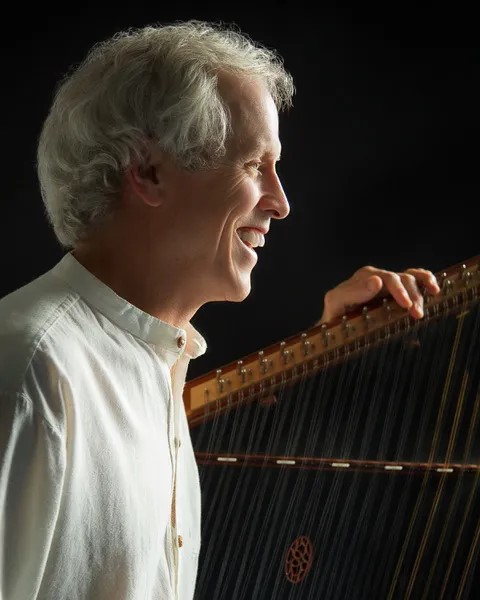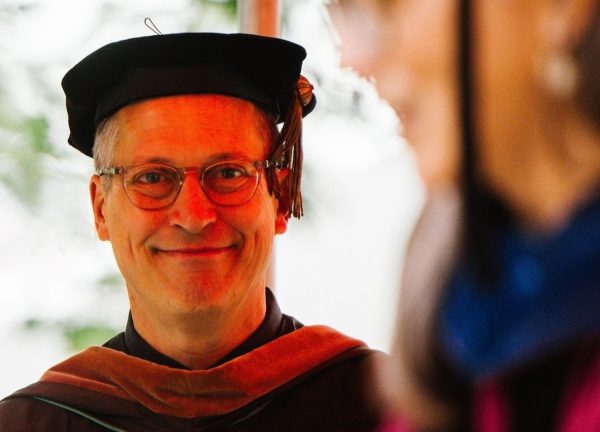A visit to the off-campus community studio and several Senior Integrated Projects (SIPs) painted a picture of life at Kalamazoo College during the city’s Art Hop festivities in May. During the monthly celebration that draws crowds to downtown Kalamazoo, the Park Trades Center, 326 W. Kalamazoo Ave., was the ultimate place for the local arts community to be.
Located only about a mile from campus, the Park Trades Center has been leasing space to artists and artisans for more than 30 years. A former manufacturing facility, this 105-year-old building has 95 studio spaces, including space used by Kalamazoo College since about 2010. Art students from K gather there throughout their senior year beginning with their SIP-preparation class in fall. That continues in winter as they work independently, and in spring when advisors meet with students. Every so often, the facility hosts Art Hop, giving students a spotlight within the city.
Josie Checkett ’25 was among the seniors who exhibited her work and benefited from the Park Trades Center this year. Her SIP, titled Shooting the Moon and Other Failures, represented her journey with growing up and the big changes that took place when she left behind her teenage years to become a young adult.
“When I became a senior and got studio space in the Park Trades Center to start working on my SIP, going there almost every day to work shifted my mindset from being an art student to being an artist,” Checkett said. “You get exposed to more opportunities to show work, you meet other people who work or have studios in the building, and you’re not beholden to the hours and resources of the Light Fine Arts building. If you do it right, it’s almost like doing a residency.”
The main area of K’s community studio at the Park Trades Center is used as a classroom and a critique and exhibition space, with the rest split into individual spaces for each studio art major or SIP student to work. In a typical year, about 12 to 15 students conduct studio SIPs in the department, Professor of Art Sarah Lindley said.
“Students have 24-hour access throughout the year, and many use the studio throughout the long winter break, which provides continuity in addition to an accessible workspace,” Lindley said. “The space is managed by a post-baccalaureate fellow, who is a working artist and also has a studio in the space. The fellow serves as a liaison between on- and off-campus resources, a mentor for students, a safety monitor for tool use, an exhibition coordinator and a helper with other essential programming in the department.”
Jacob Converse is the current post-baccalaureate fellow and he relishes his studio manager title. He said students and faculty are lucky to share the Park Trades Center with many working artists and people in trades of several varieties. The professionals include glass blowers, furniture and cabinetry makers, book binders, papermakers, barbers and photographers. It even has a wallpaper-printing studio.
“Art Hops are an exciting event with many Park Trades Center members opening their doors to the public to explore, shop and meet others interested in the arts,” Converse said. “It’s a hallmark experience for our students who gain vital exhibition experience along with the benefits of sharing ideas and receiving constructive feedback for future endeavors.”
Art Hop is an important part of the student experience for all levels of students. The studio hosts art hop exhibitions for seniors in fall and winter, which highlight the different stages of SIP development, and the spring features the department show. There were even a few non-art majors included this year because the students enjoyed their art classes and were proud of what they created.
“I know many of the students who attended this year’s Art Hop enjoyed meeting some local alumni, and many of the recently declared art majors are looking forward to working here, as they appreciated this exciting introduction to the studio space and its multifunctionality,” Converse said.



Lindley said the Gilmore Foundation supported the Park Trades Center for several years, and there have been numerous community collaborations there over the years, including partnerships with the Mary Jane Underwood Stryker Center for Civic Engagement along with some student-run community projects. The pandemic changed that somewhat. But the annual student show remains a highlight, with many students venturing off campus to share their work and participate in the local arts community.
Checkett says she hopes that students will continue to push their arts horizons there.
“It’s easy, especially when you live on campus, to forget we are living within an entire community, and one that has a very active art scene at that,” Checkett said. “Both showing work at Art Hop and attending other parts of the event gets students out into that community. When you’re an art student and your studio time, your critiques, most of the other art you see on a daily basis is all made by your direct peers, it’s good to broaden that scope. The Park Trades Center provides a valuable experience.”






























